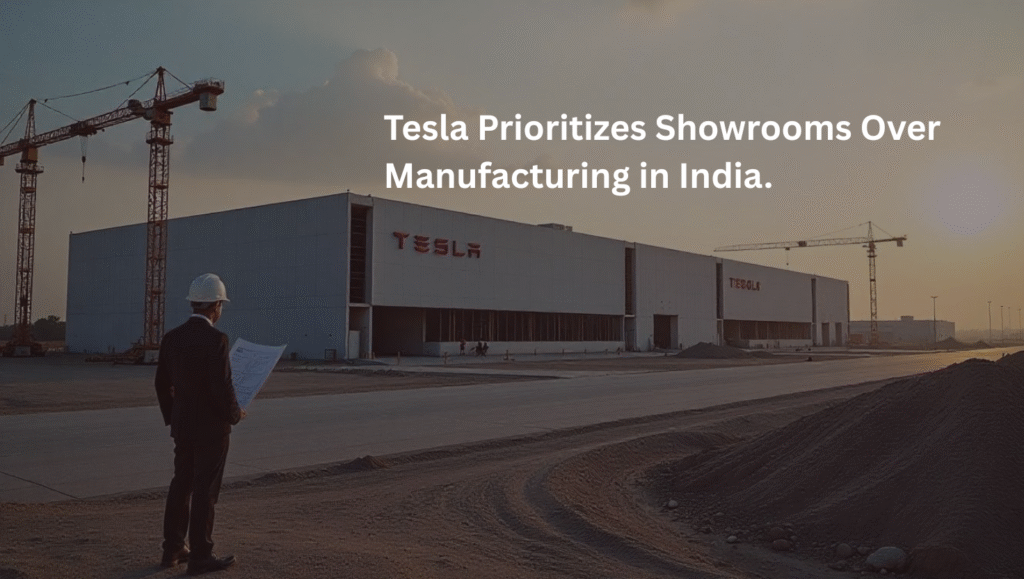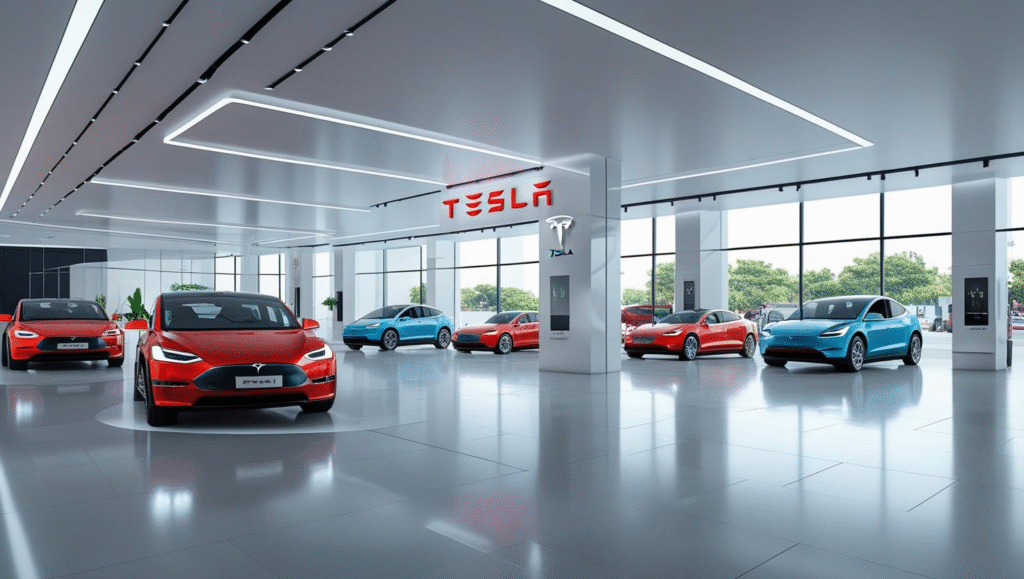
Tesla, the world’s electric vehicle (EV) behemoth under the leadership of Elon Musk, does not intend to produce in India, but will instead prioritize setting up showrooms to retail imported vehicles, Union Heavy Industries Minister H D Kumaraswamy said.
This confirmation, announced in a press conference announcing guidelines for Scheme to Promote Manufacturing of Electric Passenger Cars in India (SPMEPCI), dispels hopes of domestic production despite India’s aggressive drive to be a world EV manufacturing hub.
While India’s USD 7.09 billion EV market expands at a 36.7% CAGR, Tesla’s move underscores difficulties in bringing big players in, even with sweet incentives, in the backdrop of geopolitical tensions and operational challenges.
Kumaraswamy’s June 2, 2025, declaration made Tesla’s position clear: “They are only to commence showrooms. They are not interested in manufacturing in India.” The limited involvement of the company—only at the first round of SPMEPCI stakeholder consultations and missing out on subsequent rounds—reiterates its hesitation, according to government officials. Tesla’s interest lies in importing cars, taking advantage of concessions under the India-US free trade agreement to cut costs, with Mumbai and Delhi scheduled for showrooms.
A 4,003 sq ft Mumbai store in Bandra Kurla Complex, rented for $446,000 per annum from February 2025, marks this retail-led approach.
India’s SPMEPCI, communicated in March 2024, provides a 15% import tariff (from 70%) for firms to invest USD 500 million in domestic production, with conditions of 25% DVA in three years and 50% in five, along with a minimum ₹4,150 crore investment.
Though European and Asian carmakers such as Mercedes-Benz, Skoda-Volkswagen, Hyundai, and Kia have expressed interest, the absence of Tesla stands out. “Mercedes-Benz, Volkswagen-Skoda, Hyundai, and Kia have already expressed interest,” Kumaraswamy added, pointing to India’s attraction for left-hand-drive markets.
Tesla’s move is consistent with U.S. President Donald Trump’s position, who termed a possible Indian plant “unfair” to the U.S., claiming tariff avoidance.
This mirrors Musk’s 2024 campaign backing of Trump, potentially putting Tesla into play. Prior enthusiasm regarding Tesla’s India plans, spurred by Musk’s scheduled 2024 trip (postponed for a China tour) and a $2 billion investment commitment, has dissipated.

India’s tariffs of as much as 110% had led to Tesla pushing for cuts, but it continues to focus on making use of current factories in Germany and China, with Giga Berlin set to prepare exports to India.
India’s EV ecosystem continues to struggle to attract global behemoths. High cost of operations, standing at 12% of production value compared to China’s 8%, and dependence on imported lithium hamper competitiveness, according to a 2024 SIDBI report. MSMEs, making 30% of EV parts, face R&D expenses of ₹1–2 crore per year. Skill deficits, having just 5% of Skill India’s 2 million trained workers with EV tech skills, and infrastructure challenges such as unstable power in Tier 2 cities, at ₹1–2 lakh per month, provide roadblocks.
Chinese EV manufacturer BYD’s India interest has been spurned because of geopolitical interests, further curtailing choices.
Government programs seek to fill these gaps. The Production-Linked Incentive (PLI) scheme, with ₹18,100 crore for battery manufacturing, and PM Gati Shakti’s logistics enhancements support local production.
The SPMEPCI’s application window, opening soon for 120 days until March 2026, will test global interest. The Open Network for Digital Commerce (ONDC) and Skill India’s training programs bolster supply chains and skills. Regulatory lag in tech approval (4–6 years compared to China’s 2) and low awareness among MSMEs retard progress, however.
Experts propose solutions. Subsidies from the Technology Upgradation Scheme can reduce MSME expenses.
Increasing Skill India’s training in EVs can fill gaps. Public-private partnership with IITs and foreign companies can leverage R&D. CII-sponsored campaigns can lure investors. Enhancing 5G and power reliability through PM Gati Shakti will boost manufacturing efficiency.
Tesla’s showroom-only strategy, focusing on imports rather than manufacturing, reflects India’s struggle to localize EV production.
With a USD 3 billion EV component market envisaged by 2030, India has to overcome cost, skill, and infrastructure challenges to attract global players. Though Tesla’s lack is painful, the interest shown by Hyundai, Kia, and others provides hope for India’s green mobility revolution.
